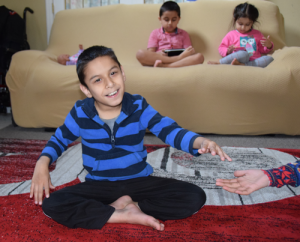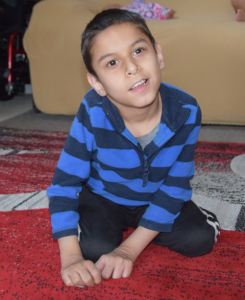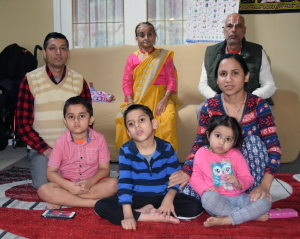- Fax- 740-322-6990
- 740-349-6588
- 800-325-2848
‘Everyone has been very supportive of us’
Meet DJ!
December 19, 2019Paving the way!
January 7, 2020The Subedi family is grateful for their life in America and all the people who support their son.
As they watch their son Ronish relaxing on the floor of their living room, playing with his iPad, Lok Subedi and his wife Hari are both struck by how far their 10 year old has come.
When he was born, fighting for life in a hospital in Nepal, it was hard to imagine a time when he would be able to go to school and join his family on a trip to  the store.
the store.
Adaptive equipment, such as ramps, lifts and communications devices have opened up his world and support from relatives, neighbors and community agencies, such as the Licking County Board of Developmental Disabilities, have given them confidence that Ronish will have the resources he needs to have the best life possible.
“Everyone has been very supportive of us,” Lok said.
Sitting in their Reynoldsburg home, Lok and Hari reflected on the past 10 years and the journey their family took to give Ronish and his younger siblings, Ritesh and Ashmita, a better life.
Both Lok and Hari can trace their ancestors for generations back to the country of Bhutan. But in the 1990s, when they weren’t much older than Ronish is now, their families and thousands of other Nepali-speaking Bhutanese people were deported to refugee camps during a period of political unrest.
Hari and Lok both grew up and completed their education in the Belgangi refugee camp. After they married, they had made plans to follow other family members to the United States when they found out they were pregnant with their first child, due in September of 2009.
Although organizations and aid groups provided many of the supplies families needed to survive in the camps, resources such as jobs and prenatal care were not readily available. Most babies were born at home, Lok said.
When it was clear that Hari was having complications during labor, they went to a health center inside the camp, which transferred her to the AMDA hospital, also known as Siddhartha Children and Women Hospital.
For a while it seemed like a Caesarean section was her only option, and her family frantically rushed to find someone who could give her a direct blood transfusion, so she could survive the surgery.
While their family was struggling to find a donor, doctors transferred Hari to Biratnagar Hospital. After they rented an ambulance to take her there and  secured a blood donor. Hari was able to deliver Ronish without surgery.
secured a blood donor. Hari was able to deliver Ronish without surgery.
The couple was thrilled to find out they had a son. But his life was still in danger and the hospital didn’t have room in its intensive care unit.
His parents rented another ambulance to take him to a children’s hospital in Dharan, far from their home. They had to manually give him oxygen for hours, until he was finally admitted into the ICU
They weren’t able to see their son for 11 days, which they spent sleeping in a waiting room and buying the medications he needed. Family and friends sent them money to help pay for their food and medical bills.
When they were finally able to take their son home, it was clear Ronish had significant disabilities but they didn’t have much information about his diagnosis.
After his first birthday, their family was able to finalize their plans to come to America. When they arrived in Albany, NY, they took Ronish to the hospital.
He was diagnosed with cerebral palsy, and a seizure disorder, which was able to be controlled by medicine. He started physical and speech therapy and began receiving Early Intervention services.
It was difficult, being in a new country where they didn’t speak the language, but they received lots of support, Lok said.
“Everybody helped us. Our neighbors really helped us,” he said. “Ronish started improving a lot.”
Ronish continued with Early Intervention when his family moved to Franklin County, and then continued to receive support from the Licking County Board of Developmental Disabilities when they moved to Reynoldsburg in 2015.
 Ronish now attends Baldwin Road Junior High School. He enjoys going outside, playing on the iPad and exploring new places.
Ronish now attends Baldwin Road Junior High School. He enjoys going outside, playing on the iPad and exploring new places.
As he’s grown, LCBDD has helped his family get the adaptive equipment he needs to be as mobile as possible, Lok said. The board has also been able to help them navigate the Medicaid funding system and find a provider agency to help with Ronish’s daily needs.
“If we didn’t have a service coordinator, we would be lost,” he said.
As Ronish gets older, Lok and Hari would like to see him learn to walk and do more things independently. They are hopeful with speech and physical therapy, he will learn to use a communication devices so he can express his wants and needs.
They recently hosted a week long celebration at their home to pray for Ronish’s health and give thanks for his life. He was surrounded by loved ones, friends and neighbors.
That meant a lot to their family, Lok said.
“I just want to say to everybody we are so thankful for America, for all the people of America who have helped us,” he said. “It’s been great for us.”
For more information on the Licking County Board of Developmental Disabilities, call 740-349-6588.




